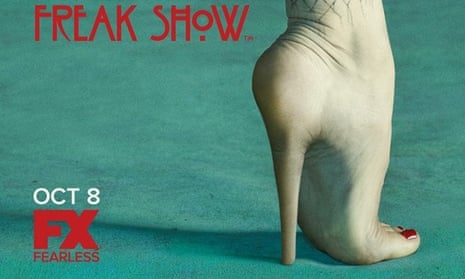Are you freaked out?
Some people in show business want you to be: the deeply unsettling ads for American Horror Story “Freak Show” are determined to make you associate “freaks” with something “scary” and “strange”. In an effort to recall the very side shows in which John Merrick was displayed, the pending Broadway revival of The Elephant Man already has theatre signage imploring passers-by to “Behold an extraordinary freak of nature” (though the actor portraying Merrick isn’t made up as such). And who knows how many people may come out of Side Show humming the often-sung and whispered:
Come look at the freaks
Come gape at the geeks
Come examine these aberrations
Their malformations
Grotesque physiques
Only pennies for peeks
But what goes too often unsung is the fact that “freak” is a term first applied to people with disabilities – and the sudden ubiquity of the word in popular culture risks bringing back into vogue a term used far too often to marginalize those who don’t match up with what is far too often termed as “normal”.
What’s normal anyway?
“Freak” is a particularly ugly word when applied to a person with a disability, since it is not only designed to other them, but because it also implies that they are but objects of fear and horror. Many people went to see side shows in order to gaze with fascination, superiority and revulsion at people who, in some cases, could find no other employment – but developed extraordinary skills to combat that – and for whom medical treatments and assistive tools were unavailable.
The term may be used in an historically accurate way with each of these recent, high-profile examples, but more people will see or hear the word “freak” than will actually see the pop-culture totems that employ them. It is a twisted kind of insinuation, delivering the term back into common parlance devoid of any context or understanding in the artistic work. (Notably, in its out-of-town run at The Kennedy Center, Side Show’s cast anachronistically but diplomatically used the term “disabled” at one point, so it’s not impossible to alter antiquated and offensive language for modern audiences.)
For example, one need only look at the uptick in the use of the word “crippled” after Martin McDonough’s The Cripple of Inishmaan played on Broadway in the spring. In Ireland in the 1930s, no one stopped to find a more proper term for the boy that they all called – to his immense frustration – “Cripple Billy”. But when the show was discussed or written about, the term was used over and over again to describe the character in reviews – and not in direct quotes. Some critics were seemingly of the opinion that, since it was spoken so often in the play, they could use it in their own writing in 2014.
Just like our language regarding race, the best term for discussing those who have disabilities evolved. Terms like “handicapped” and “differently abled”, which were seen as proper not so long ago, are now problematic. Long-prevailing language like this was imposed upon minority groups without their consultation or consent; now it’s incumbent upon us to employ the terms that people choose for their own self-definition.
While some LGBT activists, for instance, embrace the derogatory “queer” as an emblem of their own efforts at acceptance – and to confront those who sought to oppress them – there are those in the disability community who proudly call themselves “freaks” or “crips”. But just as someone straight should not call an LGBT person “a queer”, no one should think that they have the right to label someone with a disability “a freak”.
As Christopher Shinn wrote so eloquently for The Atlantic, disability is not a simply a metaphor for the struggles of those without disabilities. And “freak”, when applied to a person with disabilities, is not a title of mystery and wonder. It’s a slur – and though it might be accurately portrayed on screen or on stage, it’s not yours to reclaim for someone else, even characters in a show.
